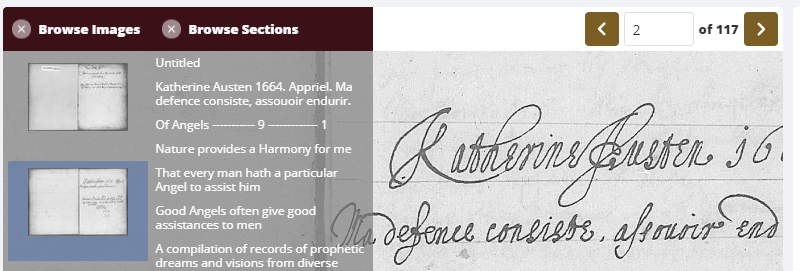The Perdita Manuscripts is an excellent resource for those interested in Early Modern history, Women’s Studies, and the History of the Book. It provides access to digital copies of little known manuscripts written by women, together with helpful notes and essays by experts in the field.
The database holds over 230 digitised manuscripts created and compiled by women in the British Isles during the sixteenth and seventeenth centuries. These previously ‘lost’ (perdita) female authors produced a diverse range of content such as account books, calligraphic writing, culinary writing, diaries, medical writing, prayers, prose, translations, travel writing, verse and more. The collection also includes writing in English, French, Greek, Italian, Latin and Spanish.

Document detail pages include a scan of the original document, which you can enlarge to read or download as a pdf, alongside bibliographic details of the manuscript. Links below provide further details, sometimes including physical descriptions of the manuscript, additional information on the repository holding the item, notes and searchable keywords.
Some manuscripts also include section details for each page of the scanned document, which have details such as genre of a section, first and last lines and folio information.

Where you have accessed the document via a search query, you’ll also find a Search Results tab, which provides an overview of where your search terms can be found in the document.
The manuscripts can be explored and accessed in three ways:
Browse Documents Section
Under the Browse Documents tab, you can browse the manuscripts by alphabetical listing, genre, repository, date, language or by particular primary authors (Perdita Women).
Search Directories
The Search Directories, available under the Research Tools tab, allow for browsing using subject terms lists (metadata). You can select from a list of Perdita Women (primary authors of manuscripts), Names in general (key names included in the database, excluding the Perdita Women), Places, and Genre.

In the Research Tools tab you’ll also find an index of the first lines of both poetry and prose texts.
Search Tool
The search tool located in the top right, provides options for a basic keyword search and an advanced search. While BOOLEAN operators, phrase searching, and wildcards can be applied in both search options, advanced search allows for a more complex query to be constructed by searching particular fields (e.g. title), limiting by date, and selecting specific terms from lists of Perdita women, languages, genres or sources.
The Help section provides further useful advice and guidance on searching the database and using the digitised images in your study, research or teaching.

